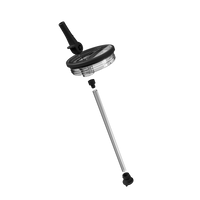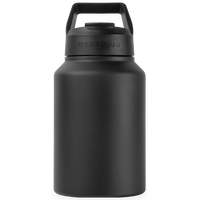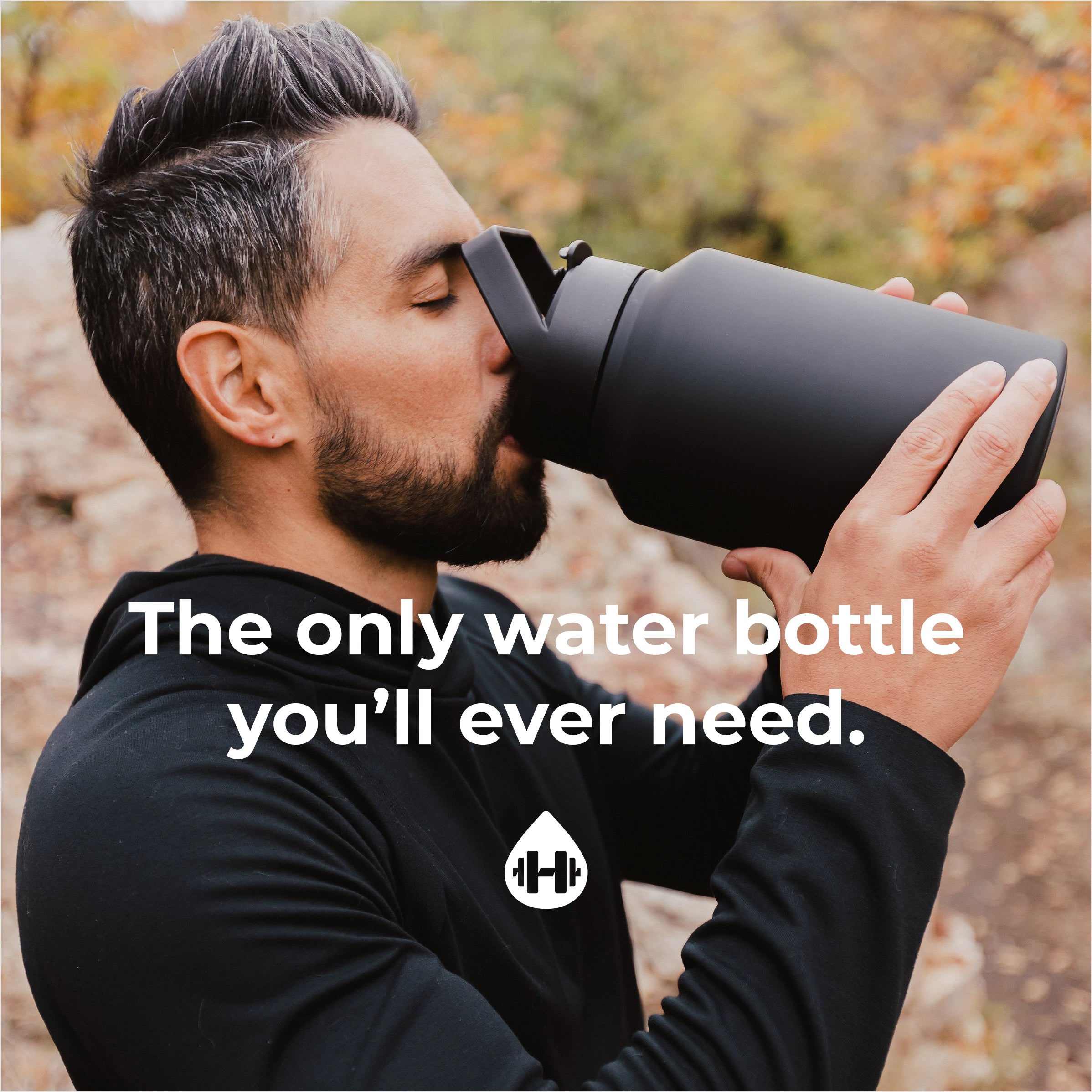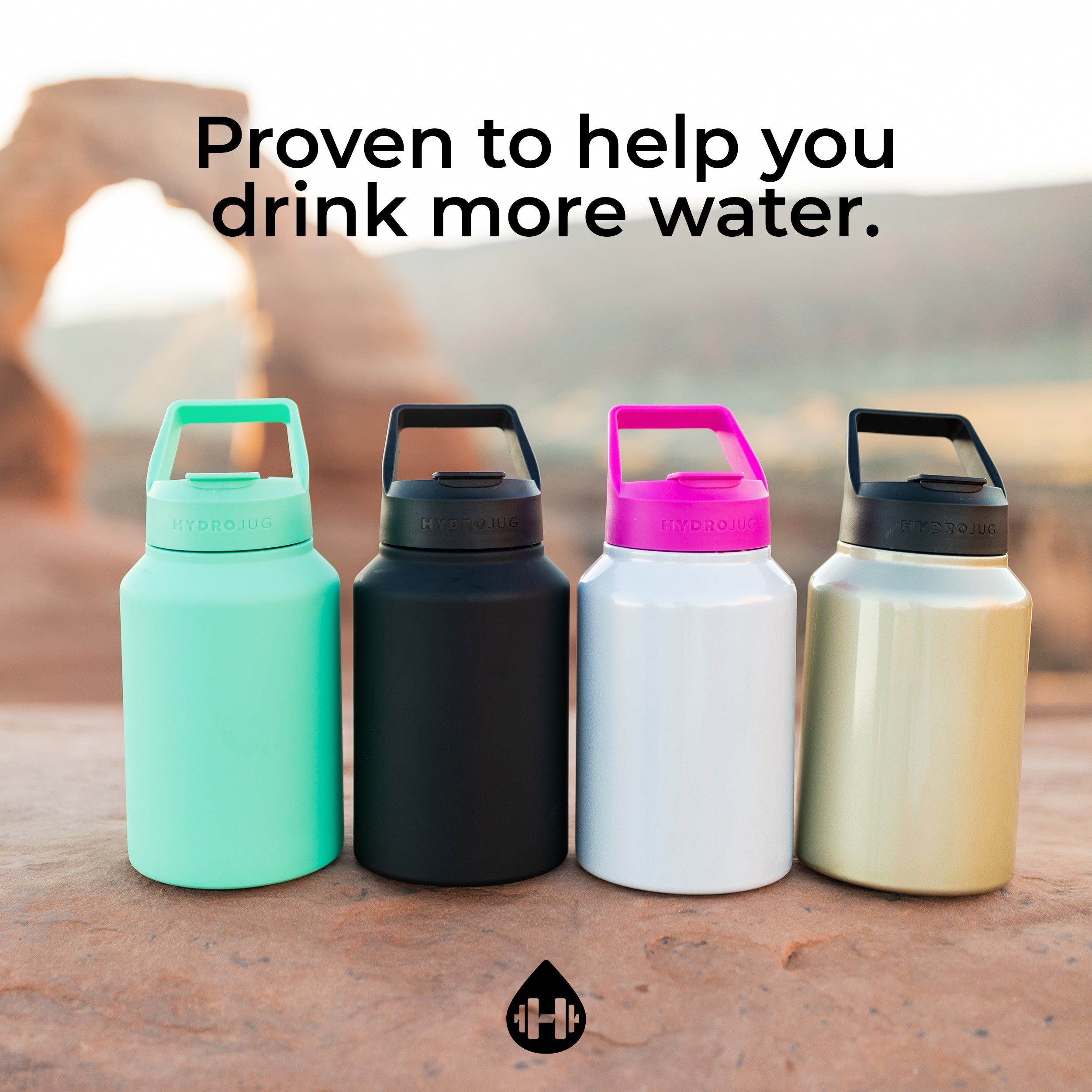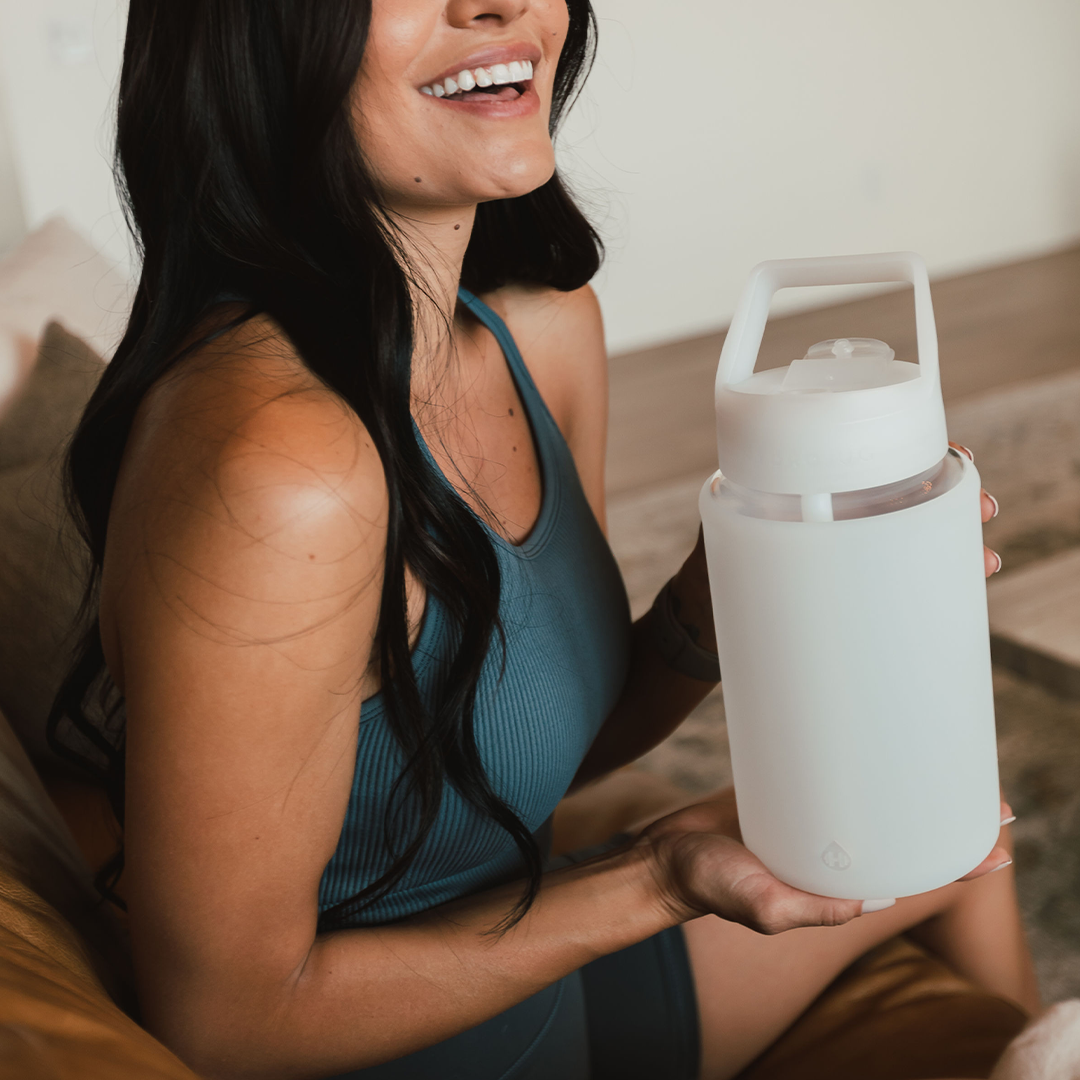
Glass Water Jug - Making Staying Hydrated Easy
Learn more about the benefits of glass water jugs and how they can help you stay hydrated.
We all know that we need to drink enough water to keep our bodies and minds functioning at their best. Still, it is not always easy to remember to drink more water, and when you do, you may not be near a faucet, drinking fountain, or shop to purchase a water bottle.
For some, it is easier to stay hydrated when they carry their own water with them. That means they have water on hand to sip throughout the day continuously. Using a glass jug means that you have water nearby, and its size means you'll have to refill the glassware less often.
A glass jug is essentially a personal, portable water pitcher. Like a water pitcher, glass jugs hold more significant amounts of water. Bringing this with you can help eliminate desperate dashes to the shop to purchase water in a disposable bottle that might end up somewhere in nature.
Why is hydration important?
Drinking enough fluid every day is vital for many reasons. Here are a few functions that water plays in your body:
- Helps to regulate your body temperature
- Keeps your joints lubricated.
- Helps to prevent infections.
- Deliver essential nutrients and oxygen to your cells.
- Remove waste.
- Keeps your organs functioning properly.
- Helps to convert food into energy.
- Cushions and protect your vital organs.
- Moistens oxygen for breathing.
- Plays a role in the optimum functioning of our senses.
- It is a main property of your blood, which is responsible for carrying nutrients to your cells and removing waste from your body.
The amount of water you drink each day can also affect your sleep quality, cognition, and mood.
Our bodies continuously lose water throughout the day when we urinate, sweat, and while we are breathing. When you vomit or have diarrhea and a fever or are more physically active and sweat a lot, you tend to lose significant amounts of fluids. This could lead to dehydration.
The general recommendation is to drink between six and eight, eight-ounce glasses of water every day. Some experts even recommend about eleven cups of water for the average woman and sixteen for men.
The amount of water that you need every day could depend on the temperature and how active you are. On warmer days, you generally need to drink more water, especially if you lose a lot of fluid from sweating.
If you exercise at a high intensity for long periods or in hot weather, you will likely have to consume more fluids. People who have certain medical conditions like kidney stones or bladder infections, or those who are sick and are vomiting, have a fever, or diarrhea, also need to take more fluids. Furthermore, pregnant or breastfeeding women or people trying to lose weight will likely need to increase how much fluid they consume daily.
Beverages other than water, like coffee, teas, milk, fruit juices, and sodas, could contribute to your daily fluid intake. Some of these options are better for your health than others. For example, water flavored with fruits or vegetables may be healthier than coffee or sugar-sweetened iced teas, sodas, and fruit juices.
If you're planning on intense exercise for more than an hour, consider including sports drinks into your diet. These drinks contain carbohydrates and electrolytes that can increase your energy. They can also help your body better absorb water. Keep in mind that some sports drinks can have high levels of sodium (salt) and added sugar as well as caffeine - all of which may be less beneficial in higher amounts.
How to tell if you need more water
If you don't drink enough water, you can become dehydrated. That means that there isn't enough fluid in your body for it to work correctly. Essential functions like your blood circulation won't occur as effectively as they should if you don't drink enough water. That means your organs may not receive the necessary nutrients, and they might experience a buildup of waste products.
Not drinking enough water is also likely to affect your mood. It could make you feel tired, grumpy, or irritable. It could also hamper your ability to think clearly.
You may not always know that you are becoming dehydrated. In fact, being thirsty is an indication that your body is already dehydrated. Here are some other signs that you should drink more water:
- Your urine is dark yellow or even amber in color.
- You urinate very little and infrequently.
- Your mouth is dry.
- You feel sleepy or fatigued (tired) for no apparent reason.
- You are incredibly thirsty.
- You have a headache.
- You are confused.
- You feel dizzy or lightheaded
- You do not produce any tears when you cry.
Although these are generally signs of dehydration, they could also indicate other medical conditions. Contact your medical provider if you have any concerns.
How to drink more water
Drinking water is not always the first thing we think of, and when you do get thirsty or remember that you need to drink water, you might not always be close to a water fountain or faucet.
Keeping a bottle of water nearby can help you stay better hydrated during the day. Adding some fruit or vegetables (like cucumber) to your water could make for a nice change from drinking plain water
If you are active, ensure that you drink water before, during, and after you exercise. You could also try drinking water on a schedule. For example, you could start a routine where you drink a glass of water when you wake up, with every meal, and before bed.
Another great tip is to drink water when you feel hungry. Sometimes you might think that you are hungry, but you are actually thirsty. You might find that you no longer feel "hungry" once you have drank some water.
When you are drinking more water, you might find that you need to urinate more frequently. This is especially the case when you drink large amounts of water at once. Instead, try to drink smaller quantities of water at regular intervals throughout the day.
Our bodies absorb colder fluids (between 40 and 60 degrees) easier. Thus, for the best absorption, you could consider adding ice to your water or drinking cool water from the refrigerator.
Advantages of glass water jugs
There are a variety of advantages to using a glass water bottle. The most significant glass bottle benefits are that they are better for you and better for the environment.
Glass water bottles are better for the environment.
Glass is made from natural materials. In most instances, glass is made from sand, soda ash, limestone, and "cullet." Cullet is recycled glass that's ready to go back into the furnace to be made into a new product.
The manufacturing process does not produce by-products, and it doesn't require any other material or chemicals. When the glass is recycled, it reduces emissions and consumption of raw materials, saves energy, and can even extend the life of the equipment used during the manufacturing process. Using recycled glass requires less energy when it's in the furnace. That means using recycled glass is more profitable for the company and more beneficial to the environment.
Glass can be endlessly recycled without losing its purity or quality. Sometimes up to 95% of raw materials used to make a glass product can be replaced with recycled glass. Because of this, recycled glass is always in high demand as manufacturers use it in producing new glass products.
Even if a glass jug is not suitable for recycling and reusing in the manufacturing of new glass containers, it could have other uses. These uses could include manufacturing tile, filtration systems, sandblasting, iconcrete pavements, or parking lots.
Glass water bottles are potentially better for you.
There are two reasons why you may want to rethink reusing a plastic water bottle: Chemical contamination and bacterial growth.
Chemicals from the plastic could leach into your drinking water. There are seven different types of plastic. Drinking bottles are usually made from two types: plastic #1 and plastic #7.
Plastic #1 is called Polyethylene Terephthalate (PET). Bottles made from PET are the single-use water or beverage bottles found in most stores. These bottles can usually be recycled and turned into new bottles. They can also be turned into polyester that can be used in fabrics and carpeting, into fiberfill for jackets and sleeping bags, or it can be used as fill for bumper cars.
PET has been approved by the US Food and Drug Administration for single and repeated use. Although that is the case, most manufacturers only produce these plastic bottles for single (or limited) use. What's more, PET bottles could release a higher than acceptable level of antimony trioxide. Suppose you are exposed to higher levels of antimony for short amounts of time. In that case, you could experience nausea, vomiting, or diarrhea. Long-term exposure could lead to high blood cholesterol or low blood sugar.
Some researchers have found that the longer water is kept in one of these bottles, the more antimony leeches into the water. They also found that higher temperatures increase the amount of antimony released. Antimony is one of the most common drinking water contaminants. However, another group of researchers found that the levels of antimony released by PET water bottles are generally low enough to be considered safe. While this field of research is still developing, it's important to consider that glass bottles have not been shown to leak any chemicals.
Plastic #7 refers to the group of plastics called Mixed or Other. Many 5-gallon water bottles and sport water bottles fall under this group. These bottles are often made from mixed resin plastics and are extremely difficult, if not impossible, to recycle.
In many cases, bottles classified as plastic #7 contain polycarbonates. Polycarbonate plastic can leach bisphenol A (BPA) - a chemical known to be an endocrine disruptor - into your drinking water. Some studies have shown that BPA can mimic the actions of estrogen., which is responsible for breast development, regulating menstrual cycles, and maintaining pregnancies. It is unclear whether drinking water from a BPA bottle affects humans, although animals exposed to BPA sometimes develop abnormal reproductive systems. The US Food and Drug Administration states that BPA is safe for consumers in its "current authorized uses."
A recent study about chemicals in plastic bottles found that the reusable water bottles usually used as sports bottles tend to release more chemicals after they have been washed in a dishwasher. Once the bottles were washed, they were filled with water and left for 24 hours. After this period, the water was tested. 400 different substances that came from plastic were found in the water. On top of that, 3,500 substances coming from the dishwasher soap were also found in the water. While researchers still need to identify most of these substances, the toxicity of at least 70% of those that have been identified is unknown.
In some instances, the researchers detected Diethyltoluamide (DEET), the active ingredient in mosquito repellent. The scientists believe that the detected substances were not intentionally added to the bottles; instead, they formed during the bottle's production or when used.
The second reason why you might want to reconsider using a plastic bottle for your drinking water is potential bacterial growth. Drinking bottles should be cleaned thoroughly with hot water and soap in between uses. You can even wash your plastic water bottle in the dishwasher, provided that it is dishwasher safe. After washing it, leave your plastic water bottle to dry completely. Bottles with scratches inside could host bacteria in the scratches and should be replaced.
Glass bottles are easy to clean
Plastic bottles often absorb the odors, flavors, and sometimes the pigments or colors of the liquid stored in them. That means your water could start to taste funny as it absorbs these residual odors or flavors. It also means that your plastic water bottle could become discolored. More than that, clear plastic bottles could become cloudy with use.
On the other hand, glass water jugs like Hydrojug won't absorb colors, flavors, or odors as readily. They are also easy to clean. The best way to clean your glass water bottle is to hand wash it with warm soapy water. Alternatively, you can sterilize it in the dishwasher, provided that it is dishwasher safe.
Which type of glass is best for drinking out of?
You will get the benefit of drinking clean, uncontaminated water from any type of glass drinking bottle. Still, not all glass drinking bottles are the same - they could be made from one of two different types of glass: borosilicate glass or soda-lime glass.
Soda-lime glass is the most common type of glass and accounts for around 90% of all glass that is manufactured. It is used for everything from window panes to glass storage jars.
The difference between Borosilicate glass and soda-lime glass has to do with the chemical composition of the glass. Borosilicate glass is made of boron trioxide with silica sand, soda ash, and alumina. Soda-lime glass is made of silica (silicon dioxide), soda (sodium oxide), and lime (calcium oxide), along with a small number of other compounds, including boron trioxide.
While the two types of glass include the same substances, the percentage of these compounds varies between the two different types of glass. Borosilicate glass contains higher silicon dioxide (silica) and boron trioxide levels. Soda-lime glass has around 69% silica and 1% boron trioxide, whereas borosilicate glass has about 80.6% silica and 13% boron trioxide.
The composition of borosilicate glass makes it more durable (both harder and more robust) than soda-lime glass. Items made from borosilicate glass tend to withstand higher temperatures better. Some manufacturers make vacuum insulated containers from borosilicate glass. These containers are better able to keep your drinks warm or cold.
Although borosilicate glass is more durable than soda-lime glass, it is still breakable. Items made from borosilicate might withstand small bumps or being dropped, but this is not always the case. Care should always be taken when using a glass drinking container.
Remember that water expands when it freezes. If you place a bottle of water in the freezer, the water could expand too much, causing the bottle to break. The same could happen if the water bottle is left in cold temperatures (like in your car during winter) for more extended periods.
Also, avoid putting hot liquid like boiling water in glass water bottles that do not expressly state that they are compatible with hot liquids. In most cases, water bottles made from borosilicate glass should be able to hold warm fluids.
How to clean a glass water jug
Glass water jugs are easy to clean. Most can be sterilized by hand washing it thoroughly with hot water and soap. Some glass water jugs are hand wash only, while others are safe to put in the dishwasher. This is convenient if you do not want to spend time hand washing your glass water bottles. Keep in mind that the lid might have different washing instructions than the bottle itself.
Sometimes water bottle lids have a removable rubber seal. This seal should be removed from time to time so that you can wash it and the lid thoroughly. Ensure that you replace this seal properly to avoid any liquid from spilling.
Some glass water bottles have built-in drinking straws. These straws should be cleaned with a straw cleaner to avoid bacteria or other nasties accumulating in them.
How heavy is a glass water jug?
Glass water jugs' weight varies depending on the size of the jug and the thickness of the walls. One fluid ounce of water weighs about one ounce. That means a half-gallon water jug filled with water will weigh around four pounds plus the vessel's weight.
Things to consider when buying a glass water jug
What will you use it for
You may prefer a smaller bottle if you only want to carry some water with you while you are on the go. On the other hand, you could fancy a larger container if you drink a lot of water and don't want to refill it multiple times during the day.
If you will be carrying your glass water jug around with you, you may want to ensure that it has a sturdy handle or strap to carry it. You might even want multiple carrying handles or different carrying options to ensure that it fits into your lifestyle. You want a hydration companion, not something that is a pain to lug around.
Glass water bottles with straws and a button or one-handed opening mechanism make it easy to stay hydrated while you are busy with something else. Still, some people may prefer glass water jugs that have a screw top or a stainless steel lid and a large opening to drink from.
When considering how you will be using your glass water bottle, think about the size, weight, and functionality.
The price of glass water bottles
The price of glass water bottles can vary greatly. In some cases, more expensive glass bottles could be of better quality. They could be made of a more durable glass and perhaps have thicker walls. However, you may be paying a lot more simply because the brand name is popular in some cases.
Investing in a high-quality, durable drinking bottle is worth it if you plan on using it often. On the other hand, if you are worried about misplacing or breaking your glass water bottle, you may want to consider a slightly less expensive product.
Does the bottle keep your beverages cold?
Considering that your body absorbs water better when it's cooler, you may want to look for a glass water bottle that will keep your fluids cold. Some glass water bottles have vacuum thermal insulation for this purpose. Although, these bottles are usually a combination of glass and stainless steel. Other glass bottles might have neoprene or silicone sleeves to help keep your water cold. They could also have larger openings to make it easier to add ice to your drink.
Customer reviews
Sometimes purchasing a glass water bottle could be a relatively significant investment. This is especially true when you are looking at high-quality, durable glassware. It is always a good idea to look at online reviews on the product you are considering. Besides reading up about other visitors' or users' experiences with the product, you may want to note how they experienced the customer service received from a particular company. A trend in this area could indicate how your concerns may be dealt with after you have purchased a product.
A glass water jug is ideal for staying hydrated throughout the day. They are perfect for those who like to drink plenty of water without the drag of constantly needing to fill up their water bottles.
Wrapping up
Glass water bottles are safe for the environment and reduce the amount of disposable plastic bottles being used every day. They are also better for you as there is no chemical leaching that could contaminate your drinking water.
When looking for a glass drinking bottle, consider how, when, and where you will be using it. In many cases, it is advisable to spend a little more money purchasing a higher quality and more durable glass water bottle that will help keep you safely hydrated.






